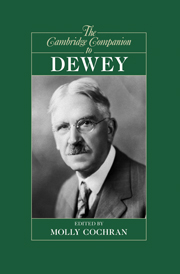Book contents
- Frontmatter
- Introduction
- 1 The making of a democratic philosopher: the intellectual development of John Dewey
- 2 Dewey’s epistemology
- 3 The naturalism of John Dewey
- 4 Dewey’s logic of inquiry
- 5 The primacy of practice in Dewey’s experimental empiricism
- 6 Cognitive science and Dewey’s theory of mind, thought, and language
- 7 John Dewey and action
- 8 Dewey’s moral philosophy
- 9 Ethics as moral inquiry: Dewey and the moral psychology of social reform
- 10 Dewey and pragmatic religious naturalism
- 11 Dewey’s aesthetics
- 12 Dewey’s philosophy of education: a critique from the perspective of care theory
- 13 Dewey’s vision of radical democracy
- 14 Dewey as an international thinker
- Bibliography
- Index
3 - The naturalism of John Dewey
Published online by Cambridge University Press: 28 September 2010
- Frontmatter
- Introduction
- 1 The making of a democratic philosopher: the intellectual development of John Dewey
- 2 Dewey’s epistemology
- 3 The naturalism of John Dewey
- 4 Dewey’s logic of inquiry
- 5 The primacy of practice in Dewey’s experimental empiricism
- 6 Cognitive science and Dewey’s theory of mind, thought, and language
- 7 John Dewey and action
- 8 Dewey’s moral philosophy
- 9 Ethics as moral inquiry: Dewey and the moral psychology of social reform
- 10 Dewey and pragmatic religious naturalism
- 11 Dewey’s aesthetics
- 12 Dewey’s philosophy of education: a critique from the perspective of care theory
- 13 Dewey’s vision of radical democracy
- 14 Dewey as an international thinker
- Bibliography
- Index
Summary
There are as many different versions of naturalism as there are naturalists. They run the gamut from tender-minded anthropomorphic or humanistic naturalisms that depict nature as made to order for us human beings because it answers back to our deepest feelings and aspirations, to the tough-minded reductive materialistic naturalisms that strip nature of all the qualities that give it human meaning and purpose. The former eschews any bifurcation between man and nature, whereas the latter wallows in it, the only comfort it gives being the realization that we - that is, our scientists - were smart enough to discover that we are aliens in a universe that cares not a whit for our weal and woe. This essay will show that John Dewey's naturalism is distinctly of the anthropomorphic or humanistic sort. First, Dewey's metaphysical theory of naturalism will be expounded, and then it will be shown what ramifications it has for his epistemology, aesthetics, ethics, and religion.
- Type
- Chapter
- Information
- The Cambridge Companion to Dewey , pp. 55 - 79Publisher: Cambridge University PressPrint publication year: 2010
- 12
- Cited by

